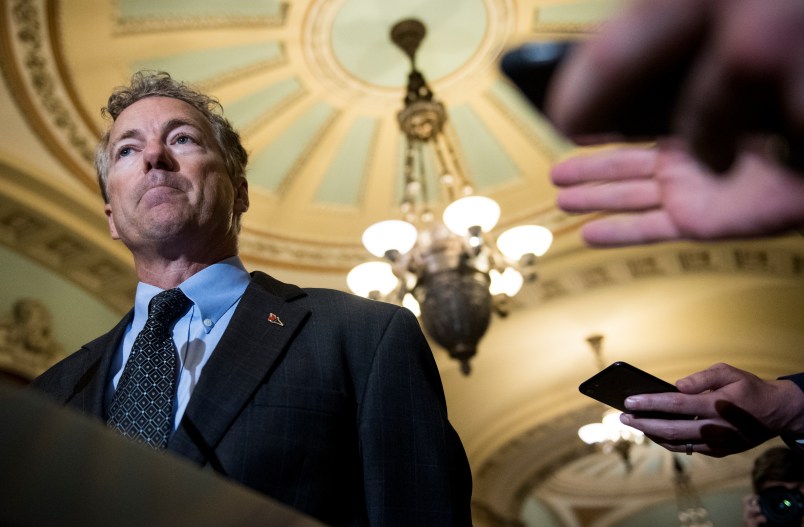After a wave of Republican defections Tuesday night tanked the Senate GOP’s main Obamacare replacement plan, the Senate held a vote Wednesday morning on bill to repeal much of the Affordable Care Act but delay its effect until 2020 to allow time to cobble together a replacement.
That vote similarly failed, 45 to 55. Seven Republicans joined with every single Democrat to defeat the bill: Sens. Shelley Moore Capito (R-WV), Susan Collins (R-ME), John McCain (R-AZ), Dean Heller (R-NV), Lisa Murkowski (R-AK), Lamar Alexander (R-TN) and Rob Portman (R-OH) all voted no.
Several Republican senators from purple states that have expanded Medicaid voted yes on repeal-and-delay, including Sen. Bill Cassidy (R-LA) and Sen. Jeff Flake (R-AZ).
The so-called “clean repeal” bill championed by Sen. Rand Paul (R-KY) would have cut more than $800 billion from Medicaid, ended the Medicaid expansion in one fell swoop, scrapped the subsidies that help low-income people buy insurance, and eliminated the individual mandate, sending the market into a death spiral. To the consternation of some hardline conservatives, it would have left many of Obamacare’s regulations in place.
The non-partisan Congressional Budget Office found that the bill would have resulted in 32 million more uninsured people over the course of 10 years, with 17 million losing coverage in the first year of its implementation.
Democrats could have raised a point of order about language in the bill that defunds Planned Parenthood, a provision the Senate parliamentarian previously said violates the rules of reconciliation—forcing the bill to clear a 60-vote threshold for passage. Instead, they allowed the vote to go forward, perhaps knowing Republicans could not even muster the 50 votes needed to advance the bill.
“Clearly it has proven challenging to get 50 Republicans on board with one solution,” admitted Sen. John Thune (R-TN). “We just haven’t quite gotten there yet.”
Despite the fact that the Senate passed a nearly identical “clean repeal” bill in 2015, which was of course vetoed by President Obama, they were unable to muster the votes under a Republican president willing to sign it into law.
Sen. Bob Corker (R-TN), once a vocal opponent of the repeal-and-delay strategy, argued to reporters Wednesday that it was the “best route” for health care reform.
“It punts it until 2020, and it forces the two parties to come together and pass something that will stand the test of time,” he said. “It sets a date out in the future where the legislation passed seven years ago is negated.”
Republicans have not been able, over the last seven years, to come up with a viable replacement for Obamacare, and there is no guarantee they would be able to do so before 2020. Asked about the danger of not doing so, Corker shrugged.
“I know it scares folks, but it’s far enough out where hopefully the two bodies can come together,” he said. “It’s not like there’s not tremendous uncertainty today.”
But other senior Republican lawmakers, including Alexander, who chairs a committee with jurisdiction over health care, told reporters it was a reckless proposal.
“We’re going to to cancel insurance for 22 million Americans and then trust Congress to replace it in two years?” he said just after the vote. “I think most pilots when they take off like to know where they’re going to land.”
After Wednesday failure of so-called “clean repeal,” Republicans plan over the coming days to craft a stripped-down shell of a bill they’re calling “skinny repeal,” which would only kill a few of Obamacare’s mandates and taxes. Corker told reporters that it’s less important what’s in that bill and more important to just pass anything out of the Senate and get to the stage of conferencing with the House of Representatives.
“People will vote on it not necessarily because of its content but because it’s a forcing mechanism for two sides of the bill to try to solve it together,” he said. “That’s the way people will be looking at it. They won’t necessarily be looking at the subject matter.”







Wait, so Graham & McCain both switched? Graham was against BCRA last night while McCain voted for. But “repeal and delay” gets a yes vote from Graham but a no from McCain?
“…it punts it until the Psychotic Orange Gasbag is removed from office and we have the Fascist Q-Tip we know from his Senate days.”
FIFY.
Related news, Sen. Jeff Merkley just filed 100 amendments to the “skinny repeal”.
Jam the fuckers up.
they’re all just fucking with us now. None of these votes mean anything. The final one will squeak through, though.
“…it’s less important what’s in that bill and more important to just pass anything…”
In the old days we would have called this “dereliction of duty”.